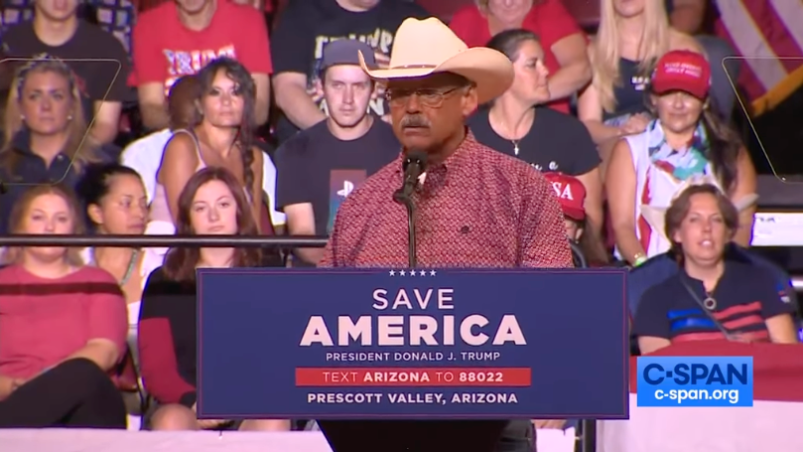In significant state-level Republican primary races across the country Tuesday, candidates who ran on lies about the 2020 election were dominant, joining a growing record of success for politicians who say the would have rejected the will of the people in that election.
That includes candidates for top offices in the two most prominent swing states to hold elections Tuesday: In Michigan and Arizona, Trump-endorsed candidates who’ve pushed lies about 2020 have secured (or are on track to secure, in Kari Lake’s case), the Republican ballot spots for governor, secretary of state and attorney general.
Lake, whose race for the gubernatorial nomination in Arizona is still too close to call, has not only said that she wouldn’t have certified Joe Biden’s 2020 victory, but also that it was “disqualifying” that her opponent wouldn’t say the election had been stolen.
State Rep. Mark Finchem, the Oath Keeper and Arizona’s new Republican secretary of state nominee, is an MVP 2020 election denier who got quite close to the Capitol Building on Jan. 6. A month after the 2020 election, Finchem said the country had come under attack by “foreign powers,” comparing the election to Pearl Harbor. “This is your nation under assault just like December 7th, 1941, a day which will live in infamy,” he wrote. He’s since sought to decertify Biden’s win in Arizona, a legal impossibility that nonetheless appears to have likely helped Finchem’s campaign.
Arizona’s new GOP attorney general nominee, Abe Hamadeh, is on the election lie train, too. In May, he wrote to Dinesh D’Souza about D’Souza’s latest hackery, 2000 Mules, saying that the film “is giving the election fraud deniers exactly what they’ve been saying doesn’t exist. Now they cannot deny that there is hard evidence of ballot box stuffing.” Not true: D’Souza’s film showed regular people using drop boxes completely legally, and was dressed up with misleading editing, false claims, ominous music and maps of Moscow to imply cheating.
Hamadeh added later in his letter: “We cannot afford another rigged election.”
Things weren’t much better in Michigan, where Kristina Karamo became the GOP’s de facto secretary of state nominee in April after winning the vote at the state GOP convention. A couple weeks before that, she told a rally, “every person in this room is aware of the corruption in the 2020 election, but we can’t just whine and bellyache,” before handing out forms to become an election worker and urging attendees to “save our republic.”
Tudor Dixon, who secured the gubernatorial nomination Tuesday after a wild Republican primary season filled with thousands of actually-illegitimate petition signatures, has recently attempted to waffle on the 2020 election question. In a Fox News appearance, she would only go so far as to say, “We have to make sure that our elections are secure and what happened in 2020 doesn’t happen again.” But she’s been more explicit it the past: Five days after the 2020 election, Dixon responded to a tweet from Trump with the message, “Steal an election then hide behind calls for unity and leftists lap it up.” Separately, she said Democrats had committed “sloppy and obvious” fraud.
The Republicans’ pick for Michigan attorney general, Matthew DePerno, who like Karamo won the party’s nod in an April convention, is perhaps more intimately involved in the 2020 #StopTheSteal effort than any other candidate.
DePerno represented a voter who sued Antrim County, Michigan over a simple human error in the 2020 election count that was quickly corrected. Trump operatives attempted to use the county to make the case that election results nationwide could not be trusted, and DePerno was invaluable in that effort, securing access to the machines for examination as part of the lawsuit. A severely flawed report on those machines was subsequently used by Donald Trump and his supporters to push nationwide fraud claims. Months later, copies of the voting machines’ digital information was still floating around conspiracy theory circles.
DePerno hasn’t gotten anywhere in court with his repeated (and repeatedly unfounded) claims of 2020 election fraud. But he has used the effort to grow his brand politically, earning Trump’s endorsement nearly a year ago, and, more recently, that of the state’s Republican senate leader — the same leader who had once warned DePerno would “encourage Trump to make even more mischief in Michigan.”
Drivers Of Election Overturn Attempt Are Now Nominees
There were some bright spots around the country Tuesday: In Kansas, election denier Mike Brown was unsuccessful in his effort to unseat incumbent Secretary of State Scott Schwabm (R).
And in Washington, two Republican members of Congress who voted to impeach Donald Trump over his role calling a vicious mob to the Capitol on Jan. 6 survived primary battles — unlike others who voted to impeach Trump.
But the ranks of honest Republicans were simply overwhelmed Tuesday by what’s now become the GOP norm: Candidates like Missouri’s new GOP U.S. Senate nominee Eric Schmitt, who as the state’s attorney general joined the suit to overturn the 2020 election results.
Tuesday even bought back one of the previous decade’s most outspoken advocates of bogus voter fraud claims: Kris Kobach — who as Kansas’ secretary of state failed so badly in defending a citizenship requirement for voters that he was ordered to take legal education classes — is now the GOP nominee to be the state’s attorney general.
Kobach was the driving force behind Donald Trump’s “Presidential Advisory Commission on Election Integrity,” which sought and failed to back up Trump’s lie that his own 2016 election victory had overcome millions of fraudulent votes for Hillary Clinton. Kobach, public records reported by TPM show, was deeply involved in the legal effort to have the Supreme Court overturn the 2020 election.



